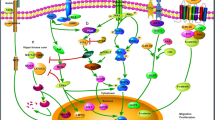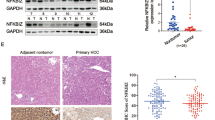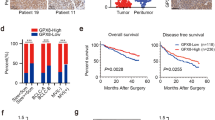Abstract
Purpose
Rho kinase is an important factor in tumor progression. We demonstrated that Rho kinase-associated coil-containing protein kinase (ROCK) is expressed in hepatic tissues in hepatocellular carcinoma (HCC) and confirmed its roles in cell survival in HCC cells using the ROCK inhibitor, fasudil.
Methods
ROCK protein levels were estimated in hepatic tissues with HCC compared with healthy liver tissues or hepatic hemangioma tissues using immunohistochemistry. Furthermore, HepG2 and Huh7 cells were cultured with ROCK inhibitor, fasudil for 24 h in vitro. Cell proliferation was evaluated using the 3-(4,5-dimethylthiazol-2-yl)-5-(3-carboxymethoxyphenyl)-2-(4-sulfophenyl)-2H-tetrazolium, inner salt assay, and apoptotic cells were detected by cell death ELISA. The expression apoptosis-related proteins were analyzed using Western blotting.
Results
Fasudil significantly decreased cell proliferation and induced apoptosis mediated by increases in p53, Bax, caspase-9, and caspase-3 in HepG2 and Huh7 cells. The induction of apoptosis was inhibited in HCC cells precultured with p53 decoy oligodeoxynucleotide.
Conclusion
These results suggest that ROCK inhibits the p53-mediated apoptosis pathway in HCC. Fasudil may thus be a beneficial approach to HCC therapy.







Similar content being viewed by others
References
Ikeda K, Saitoh S, Tsubota A, Arase Y, Chayama K, Kumada H, Watanabe G, Tsurumaru M (1993) Risk factors for tumor recurrence and prognosis after curative resection of hepatocellular carcinoma. Cancer 71:19–25
Sugihara S, Kojiro M, Nakashima T (1985) Ultrastructural study of hepatocellular carcinoma with replacing growth pattern. Acta Pathol Jpn 35:549–559
Okuda K (2000) Hepatocellular carcinoma. J Hepatol 32:225–237
Bergsland EK (2001) Molecular mechanisms underlying the development of hepatocellular carcinoma. Semin Oncol 28:521–531
Utsunomiya T, Shimada M (2011) Molecular characteristics of non-cancerous liver tissue in non-B non-C hepatocellular carcinoma. Hepatol Res 41:711–721
Orimo T, Ojima H, Hiraoka N et al (2008) Proteomic profiling reveals the prognostic value of adenomatous polyposis coli-end-binding protein 1 in hepatocellular carcinoma. Hepatology 48:1851–1863
Wang W, Peng JX, Yang JQ, Yang LY (2009) Identification of gene expression profiling in hepatocellular carcinoma using cDNA microarrays. Dig Dis Sci 54:2729–2735
Frttz G, Just I, Kanita B (1999) Rho GTPase are over-expressed in human tumors. Int J Cancer 81:682–687
Gris F, Bidaud A, Moreau V (2009) Rho GTPase in hepatocellular carcinoma. Biochem Biophys Acta 1795:137–151
Amano M, Fukata Y, Kaibuchi K (2000) Regulation and functions of Rho associated kinase. Exp Cell Res 261:44–51
Sahai E, Marshall CJ (2002) RHO-GTPases and cancer. Nat Rev Cancer 2:133–142
Takamura M, Sakamoto M, Genda T, Ichida T, Asakura H, Hirohashi S (2001) Inhibition of intrahepatic metastasis of human hepatocellular carcinoma by Rho-associated protein kinase inhibitor Y-27632. Hepatology 33:577–581
Fukui K, Tamura S, Wada A et al (2006) Expression and prognostic role of Rho A GTPases in hepatocellular carcinoma. J Cancer Res Clin Oncol 132:627–633
Wettschureck N, Offermanns S (2002) Rho/Rho-kinase mediated signaling in physiology and pathophysiology. J Mol Med 80:629–638
Tamura M, Nakao H, Yoshizaki H et al (2005) Development of specific Rho-kinase inhibitors and their clinical application. Biochim Biophys Acta 1754:245–252
Ying H, Biroc SL, Li WW et al (2006) The Rho kinase inhibitor fasudil inhibits tumor progression in human and rat tumor models. Mol Cancer Ther 5:2158–2164
Xue F, Takahara T, Yata Y et al (2008) Blockade of Rho/Rho-associated coiled coil-forming kinase signaling can prevent progression of hepatocellular carcinoma in matrix metalloproteinase-dependent manner. Hepatol Res 38:810–817
Ogawa T, Tashiro H, Miyata Y et al (2007) Rho-associated kinase inhibitor reduces tumor recurrence after liver transplantation in a rat hepatoma model. Am J Transp 7:347–355
Takeba Y, Sekine S, Kumai T et al (2007) Irinotecan-induced apoptosis is inhibited by increased P-glycoprotein expression and decreased p53 in human hepatocellular carcinoma cells. Biol Pharm Bull 30:1400–1406
Li Q, Liu D, Huang X, Guo L (2011) Fasudil mesylate protects PC12 cells from oxidative stress injury via the Bax-mediated pathway. Cell Mol Neurobiol 31:243–250
Grise F, Bidaud A, Moreau V (2009) Rho GTPases in hepatocellular carcinoma. Biochim Biophys Acta 1795:137–151
Kamai T, Tsujii T, Arai K, Takagi K, Asami H, Ito Y, Oshima H (2003) Significant association of Rho/ROCK pathway with invasion and metastasis of bladder cancer. Clin Cancer Res 9:2632–2641
Amano M, Chihara K, Kimura K, Fukata Y, Nakamura N, Matsuura Y, Kaibuchi K (1997) Formation of actin stress fibers and focal adhesions enhanced by Rho-kinase. Science 275:1308–1311
Shi J, Wei L (2007) Rho kinase in the regulation of cell death and survival. Arch Immunol Ther Exp 55:61–75
Itoh K, Yoshioka K, Akedo H, Uehata M, Ishizaki T, Narumiya S (1999) An essential part for Rho-associated kinase in the transcellular invasion of tumor cells. Nat Med 5:221–225
Genda T, Sakamoto M, Ichida T, Asakura H, Kojiro M, Narumiya S, Hirohashi S (1999) Cell motility mediated by rho and Rho-associated protein kinase plays a critical role in intrahepatic metastasis of human hepatocellular carcinoma. Hepatology 30:1027–1036
Park JW, Park CH, Kim IJ, Bae EH, Ma SK, Lee JU, Kim SW (2011) Rho kinase inhibition by fasudil attenuates cyclosporine-induced kidney injury. J Pharmacol Exp Ther 338:271–279
Rattan R, Giri S, Singh AK, Singh I (2006) Rho/ROCK pathway as a target of tumor therapy. J Neurosci Res 83:243–255
Iwamoto H, Nakamuta M, Tada S, Sugimoto R, Enjoji M, Nawata H (2000) A p160ROCK-specific inhibitor, Y-27632, attenuates rat hepatic stellate cell growth. J Hepatol 32:762–770
Nakashima M, Adachi S, Yasuda I, Yamauchi T, Kozawa O, Moriwaki H (2010) Rho-kinase regulates negatively the epidermal growth factor-stimulated colon cancer cell proliferation. Int J Oncol 36:585–592
Nakabayashi H, Taketa K, Miyano K, Yamane T, Sato J (1982) Growth of human hepatoma cells lines with differentiated functions in chemically defined medium. Cancer Res 42:3858–3863
Lin Y, Ong LK, Chan SH (1995) Differential in situ hybridization of mutational specific expression of the p53 gene in human hepatoma cell lines. Pathology 27:191–196
Hippenstiel S, Chmeck B, N’Guessan PD, Seybold J, Krüll M, Preissner K, Eichel-Streiber CV, Suttorp N (2002) Rho protein inactivation induced apoptosis of cultured human endothelial cells. Am J Physiol Lung Cell Mol Physiol 283:L830–L838
Althoefer H, Eversole-Cire P, Simon MI (1997) Constitutively active Galphaq and Galpha13 trigger apoptosis through different pathways. J Biol Chem 272:24380–24386
Cho HJ, Baek KE, Park SM et al (2011) RhoGDI2 confers gastric cancer cells resistance against cisplatin-induced apoptosis by upregulation of Bcl-2 expression. Cancer Lett 311:48–56
Levine AJ, Momand J, Finlay CA (1991) The p53 tumor suppressor gene. Nature 351:453–456
Lakin ND, Jackson SP (1999) Regulation of p53 in response to DNA damage. Oncogene 18:7644–7655
Lowe SW, Ruley HE, Jacks T, Housman DE (1993) p53-dependent modulates the cytotoxicity of anticancer agents. Cell 74:957–967
Takeba Y, Kumai T, Matsumoto N, Nakaya S, Tsuzuki Y, Yanagida Y, Kobayashi S (2007) Irinotecan activates p53 with its active metabolite, resulting in human hepatocellular carcinoma apoptosis. J Pharmacol Sci 104:232–242
Hsiao BY, Chen CC, Hsieh PC et al (2011) Rad is a p53 direct transcriptional target that inhibits cell migration and is frequently silenced in lung carcinoma cells. J Mol Med 89:481–492
Guo F, Zheng Y (2004) Rho family GTPases cooperate with p53 deletion to promote primary mouse embryonic fibroblast cell invasion. Oncogene 23:5577–5585
Gadea G, de Toledo M, Anguille C, Roux P (2007) Loss of p53 promotes RhoA-ROCK-dependent cell migration and invasion in 3D matrices. J Cell Biol 178:23–30
Acknowledgments
This work was supported in the part by grants under the Research on Publicly Essential Drugs and Medical Devices of Health and Labor Sciences Research from the Ministry of Health, Labor and Welfare of Japan. Furthermore, we thank Ms. Shigeko Onuma of the Department of Pathology, St. Marianna University School of Medicine for technical support.
Conflict of interest
There is no conflict of interest involved in this manuscript.
Author information
Authors and Affiliations
Corresponding author
Rights and permissions
About this article
Cite this article
Takeba, Y., Matsumoto, N., Watanabe, M. et al. The Rho kinase inhibitor fasudil is involved in p53-mediated apoptosis in human hepatocellular carcinoma cells. Cancer Chemother Pharmacol 69, 1545–1555 (2012). https://doi.org/10.1007/s00280-012-1862-6
Received:
Accepted:
Published:
Issue Date:
DOI: https://doi.org/10.1007/s00280-012-1862-6




